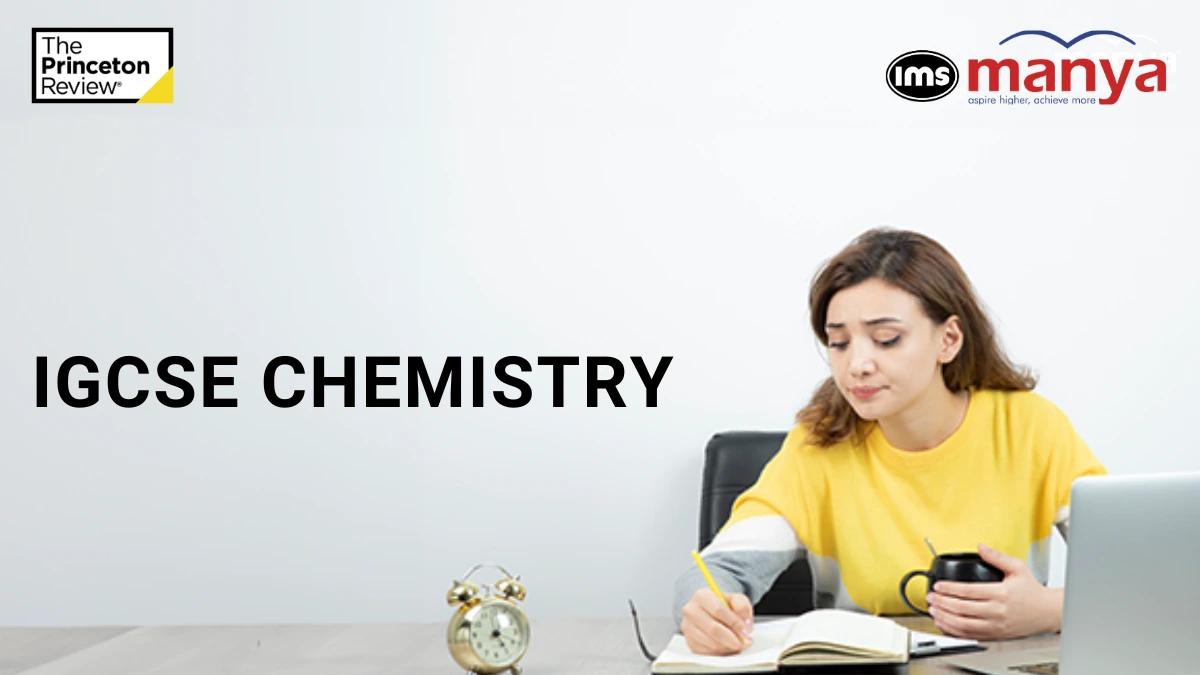IGCSE Chemistry: Syllabus, Eligibility Criteria & Preparation Strategy

IGCSE Chemistry Online Academic Tutoring aims to enlighten students about the technological world they live in. It encourages them to develop a keen interest in science and scientific advancements. This course covers the fundamentals of elements and the structure of compounds. It also addresses the reactions associated with various types of chemical compounds. Through IGCSE Chemistry, students learn how essential chemistry is in enhancing the quality of life. This includes areas such as food, clothing, air, shelter, health, and energy. The course emphasizes the importance of research and development in chemistry. It equips students with knowledge to produce valuable goods and services to meet human needs.
The IGCSE Chemistry course prepares students for advanced studies and encourages inquiry into the chemical processes that shape our world.
The IGCSE Chemistry syllabus consists of 12 topics, which are:
- States of matter
- Atoms, elements and compounds
- Stoichiometry
- Electrochemistry
- Chemical energetics
- Chemical reactions
- Acids, bases and salts
- The Periodic Table
- Metals
- Chemistry of the environment
- Organic chemistry
- Experimental techniques and chemical analysis
Cambridge IGCSE Chemistry 0620 Assessment Structure
The eligibility criteria for the Grading Scale apply uniformly and compulsorily to all IGCSE students seeking Grades A* to G. Candidates must complete three assessment papers according to their designated grade scale.
Students aiming for a grade of D or lower, who have covered the core subject content in IGCSE Chemistry, must take Paper 1, Paper 3, and either Paper 5 or Paper 6. For these candidates, the grade scale ranges from C to G.
In contrast, students who expect to achieve a grade of C or higher and who have studied both core and supplementary content are required to take Paper 2, Paper 4, and either Paper 5 or Paper 6. This is essential for eligibility for grades A* to G.
| Paper | All candidates take: | Duration | Practical test | MCQs | Theory | weightage |
| Paper 1 | 40 optional multiple-choice questions will be based on the Core subject content. Externally assessed | 45 minutes | – | 30% | – | 40 marks |
| Paper 2 | 40 four-option multiple-choice question sessions. Questions will be based on the Extended subject content (Core and Supplement), externally assessed | 45 minutes | – | 30% | – | 40 marks |
| Paper 3 | Short-answer and structured questions will be based on the Core subject content externally assessed | 1hrs 15 minutes | – | – | 50% | 80 marks |
| Paper 4 | Short-answer and structured questions will be based on the Extended subject content (Core and Supplement), Externally assessed | 1hrs 15 minutes | – | – | 50% | 80 marks |
| Paper 5 | Questions will be based on the experimental skills in Section 4, Externally assessed | 1hrs 15 minutes | 20% | – | – | 40 marks |
| Paper 6 | Questions will be based on the experimental skills in Section 4, Externally assessed | 1hrs | 20% | – | – | 40 marks |
Planning to Prepare for IGCSE Chemistry?
Cambridge IGCSE Chemistry Assessment Objectives (AOs)
In the IGCSE Chemistry curriculum, there are a total of three Assessment Objectives (AOs), each crafted to evaluate and enhance the core skills of IGCSE students through various tasks and structured examinations.
AO1: This objective is designed to provide IGCSE students with a comprehensive understanding of core concepts in chemistry, encompassing essential facts, laws, terminology, and vocabulary. It stresses the importance of being comfortable with scientific instruments and conventions, as well as applying scientific and technical knowledge within the field of chemistry. By mastering these components, students build a robust foundation that facilitates their ongoing education and exploration in the subject.
AO2: This assessment objective is centered on enhancing the students’ abilities in understanding complex concepts and honing their problem-solving skills. AO2 not only focuses on the comprehension of chemical principles but also emphasizes the importance of effectively presenting and translating information. Additionally, it aims to improve students’ skills in manipulating numerical data and conducting thorough data analysis, which are crucial for success in scientific inquiry.
AO3: The main objective of this Area of Assessment (AO) is to introduce students to the practical applications of chemistry by engaging in both experimental and theoretical explorations. It highlights the importance of adhering to safety protocols in laboratory environments and emphasizes the need for precise recording of observations and measurements. Through hands-on experiments, students acquire a deeper understanding of how chemistry relates to everyday life, while also cultivating crucial skills applicable in real-world scenarios.
Overall, the three AOs collectively ensure that IGCSE Chemistry students cultivate a comprehensive skill set that prepares them for future academic pursuits and practical applications in the field of science.
Table of Weighting in IGCSE and Component % for AOs
| Weighting in IGCSE and Components % | ||||
| Assessment objective | Weighting in IGCSE % | Paper 1 & 2 | Paper 3 & 4 | Paper 5 & 6 |
| AO1 | 50 | 63 | 63 | 0 |
| AO2 | 30 | 37 | 37 | 0 |
| AO3 | 20 | 0 | 0 | 100 |
| Total | 100 | 100 | 100 | 100 |



